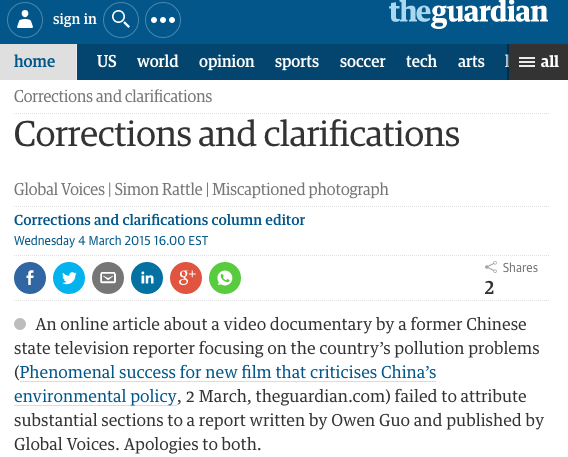Global Voices writer Owen Guo spent last Sunday—the day of his 28th birthday—writing a story [2] about a documentary on China's horrific pollution problem that had been released hours before. By the time Owen’s story was published on Global Voices, the film had already been viewed 30 million times. During a chat session we had afterwards, he told me, “I'm really glad I spent my birthday doing something meaningful like this”—echoing the impulse that has kept the Global Voices community and our reporting alive and thriving for 10 years.
You should read Owen's story [2]—it’s excellent. A writer at the venerable Guardian [3] newspaper thought so too, copy-pasted significant portions of Owen's story and published it under his own name the following day. If you selected a sentence from Owen's piece and ran it through a search engine, chances were the Guardian story [4] would appear in the results—such was the extent of the similarity. The writer had cribbed more than four of Owen’s paragraphs completely, and the essence of the piece was similar as well.
The Guardian story did not mention either Owen or Global Voices.
48 hours after the Guardian piece was published, the plagiarized paragraphs came to our attention. We contacted both the author and The Guardian’s readers’ editor. The author e-mailed an apology, as did someone from the readers’ editor's desk. A few hours later they added the necessary attribution, citing Owen several times, plus a correction at the end of the story. They also published a note in both the web and print versions of their corrections column [1].
But Owen, who started working in journalism four years ago, still feels cheated.
Not only did The Guardian steal his byline, the incident also left him feeling betrayed by a profession he deeply respects.
Our community also feels cheated.
This isn't the first time a reputable mainstream outlet has lifted Global Voices reporting verbatim from the site and presented it as their own work, and our community knows it won’t be the last. This in spite of our very liberal Creative Commons license and Attribution Policy, [5] which allows anyone to republish our content for free with proper attribution.
Are the journalists who plagiarize our work exploiting the fact that we’re a small media outlet? As one colleague has pointed out, how come the Guardian writer didn’t lift the paragraphs from the New York Times article on the documentary that was published online shortly after Owen’s story?
To ask how we can fix this is beyond the scope of this piece, as journalistic ethics are forever under threat, and not only in the online space [6]. But we still believe it’s a question worth asking: beyond the obvious reactive and retroactive steps, what's the fix here? What can we do to encourage the journalism industry to hold itself to higher values?
